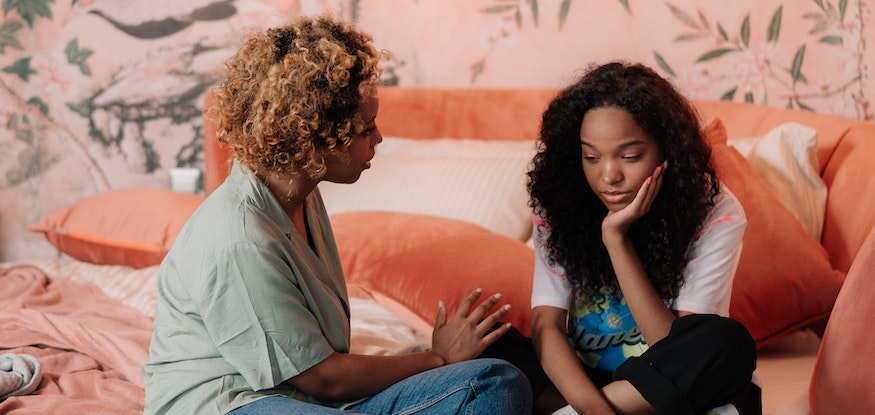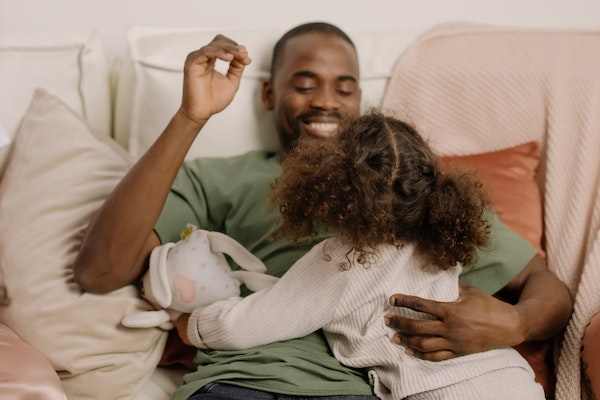How to Talk to Your Kids About Sex

Since becoming a sex educator, I’ve received countless sex questions spanning every topic imaginable. However, some questions seem to pop up more often than others, and one of the more common ones is: How should you talk to your kids about sex? A heck of a lot of parents don’t even know where to start with this, and I can’t say I’m surprised. After all, many of them never got a sex talk from their own parents, let alone received any kind of formal sex education in school.
Few among us have a template for how this should go, which is probably why several parents have actually asked me to have “the talk” with their kids for them! I have politely declined these requests and, instead, referred the parents to resources for facilitating these conversations themselves because I think it’s usually best for this information to come from a parent instead of a stranger.
Surveys find that teens say their parents are the most influential people in their lives when it comes to making sexual decisions—even more so than their friends and the media. Teens also say they would have an easier time making healthy decisions about sex if they could talk more openly with their parents about the subject. For these reasons and more, it’s important for parents to step up and play an active role in sex education, even if it might be a little awkward or embarrassing at times. So here are a few helpful tips for getting started.
Break it up into small pieces, and consider it an ongoing conversation
One of the reasons “the talk” seems so intimidating is that we’ve built it up in our minds to be this huge deal: you have to find that one “right” or perfect moment to sit down and cover everything that your kid needs to know about a topic that you yourself might find difficult to discuss. That’s a very high hurdle! So, the first step is reframing this in a way that will lower the hurdle. Think of it instead as a series of small, bite-sized talks that start early on and actually get easier over time as you normalize the subject. What you’re doing here is slowly creating all of the building blocks that will form a solid foundation for healthy parent-child communication later on and establish you as a trusted source of information.

Start the conversation early, and keep it age appropriate
I’m often asked what the right age is to start talking to your kids about sex and, frankly, it’s never too early to get started, as long as you’re keeping it age appropriate. What your kid needs to know depends on their developmental stage. Here are a few easy ways to get started in early childhood:
Teach your kids the proper names for their body parts instead of making up names or only calling them “private parts.”
Teach them the basics of boundaries and consent. What kind of touch is appropriate vs. inappropriate? What should they do if someone touches them in an inappropriate way?
Show respect for their bodily autonomy. If your child doesn’t want to hug a relative, don’t force them to do so.
As they get older, you can tie the information you share to their natural level of curiosity (most kids will eventually ask where babies come from). You can also tie it to how their body is changing (puberty offers a natural segue into talking about things like menstruation and wet dreams), what they’re learning about sex in school (you can ask what they learned and whether they have any questions their teacher didn’t answer), and their romantic development (if they’re going to a school dance or on a date, this can be an easy opportunity to start talking about navigating relationships and intimate feelings). As they age, you will start to see that there are so many natural opportunities to keep moving the conversation forward. Take advantage of them as they arise. Another easy way to keep the conversation going is to tie it in with things you see together in the media.

Take some time to educate yourself, and bring in a pinch hitter when you don’t have all the answers
If you didn’t receive any sex ed yourself, you might need to start by educating yourself so that you’re equipped to provide factual information and to answer questions that your kid(s) might have. Also, keep in mind that many things about sex may have changed since your youth (e.g., new contraceptive options, different language, new identities), so brush up on what a young person today needs to know. Even if you already have a pretty good knowledge base, recognize that your child might have different sexual health needs than you that aren’t being addressed elsewhere. For example, most sex ed programs leave out LGBTQ+, neurodiverse, and disabled youth. For these individuals, parental support is all the more important. If you don’t have the relevant knowledge, try and learn as much as you can. And if you need help filling in the gaps, don’t be afraid to bring in a pinch hitter. For example, you might engage your child’s doctor or another trusted healthcare provider to assist and answer questions.

Talk about more than just reproduction
A lot of sex ed focuses mainly on issues related to sexual reproduction. While that’s certainly important to understand, the truth of the matter is that sex is something that is rarely done for procreation, which means that we need to help our kids understand sex in a much broader context. For example, consider that the single most common reason people pursue sex is pleasure. When the only thing youth have been taught about sex is either abstinence and/or avoidance of negative outcomes (e.g., STIs, unintended pregnancy), they’ve been done a disservice because they haven’t learned a thing about how to make sex a positive, pleasurable, or special experience. Shouldn’t they also learn that consensual sex is supposed to feel good? It saddens me how many folks I’ve spoken to (women in particular) who didn’t enjoy or want sex for much of the lives because it was always physically painful when they did it—and they actually thought it was supposed to be that way because they had never learned anything about pleasure. Sex didn’t become a joy for them until they learned what they really needed to know about sex and their body. So, yes, do talk about consent and all of the safety-related issues (e.g., condoms, contraceptives, etc.), but talk about pleasure, too, including self-pleasure. Talk about how sex isn’t just one thing. Talk about how to communicate and set boundaries. Talk about as much as you can—there’s no risk in knowing too much about sex!

Keep calm, and carry on
Odds are, you’ll encounter moments of awkwardness and embarrassment along the way, but don’t let that hold you back. Recognize that this awkwardness stems from sex being a foreign subject of conversation for most people. The more you discuss it, the more comfortable and confident you’ll be in talking about it. Recognize, too, that you might not always have the words or the answers—and in those cases, it’s OK to bring out a book or resource to help. And if your child confides in you about their own sex life, avoid the tendency to overreact because that can shut down the lines of communication. Remember that you may very well be the only person in their life they can speak to about this and other complex issues.
Takeaways
If you don’t know when or how to talk to your kid(s) about sex, you’re not alone. But that’s not a reason to avoid the topic! Think of “the talk” as a series of bite-sized, age-appropriate discussions about what your child needs to know as they get older, and their sexuality develops. Start early, educate yourself as needed, and don’t limit conversations to the negative side of sex—talk about the positive side as well. Lastly, recognize that any awkwardness will ease over time, and that a little bit of temporary awkwardness is a worthwhile tradeoff for knowing that you’ve equipped your kids with the knowledge and skills they need to lead healthy and happy intimate lives.
For more resources on talking to kids about sex, I highly recommend the following books:
“Read Me: A Parental Primer for ‘The Talk’” by Lanae St John
“S.E.X. The All-You-Need-To-Know Sexuality Guide to Get You Through Your Teens and Twenties” by Heather Corinna
“Let’s Talk About Body Boundaries, Consent, and Respect” by Jayneen Sanders and Sarah Jennings
